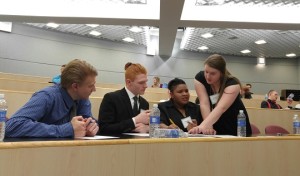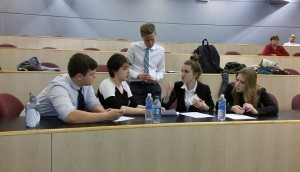Annual ethics bowl challenges area high school students on moral and social problems
SIUE’s Lyceum club hosted its second annual High School ethics bowl Saturday, and the event has continued to grow in less than a year since its inception.

Members of the Collinsville High School team discuss their response during the final round of the 2016 High School Ethics Bowl at the Engineering Building Saturday. The event was hosted by the SIUE Lyceum philosophy club. (photo by Joseph Lacdan)
The event expanded its field of teams from three to eight teams, including a high school from Kentucky, Westview High School.
The Lyceum, SIUE’s philosophy club led by senior Stephen Wilke, recruited graduate students from St. Louis University and professors from area colleges to serve as judges. In addition, SIUE professors Alison Reiheld, Sue Cataldi, Matt Schunke, Matthew Cashen, Greg Littmann, Chris Pearson and Rachael Wurth were among the judges.
Triad High School took first place, with Collinsville High School finishing second and Edwardsville placing third. Students were given topics selected by the National High School Ethics Bowl committee, with the final topic written by SIUE philosophy professors. Each high school team was given the topics to study and prepare for a month in advance. Topics discussed included confronting bigotry, water pollution in Flint, Michigan, whether it is more important to save a historical piece of art or a human life, whether or not debtor’s prisons should exist and whether it is moral to breastfeed in public.
“The cases are from a huge spectrum of different ethical dilemmas that they may or may not face in real life, in careers and in academics,” said Lyceum public relations director Corey Huber. “So one, it’s prepping them to be thinking about issues that they might actually face in the real world. And two, it’s teaching them arguing skills, so they can articulate their positions not only in writing, but also verbally.”
Triad moves on to the national competition, which is scheduled to take place at the University of North Carolina at Chapel Hill.
Lyceum club members said the Ethics Bowl provides high schoolers a unique opportunity. High school students tackle socially relevant topics in a university setting and can get interaction with college professors, Lyceum club member Kristin Cline said.
“I think it gives students an opportunity to really discuss current issues in an open and safe environment and to kind of give their ideas on what should be done about these current issues, and then to receive feedback from professors and people in the philosophy department,” Cline said. “It’s a chance for [high school students] to really expand their knowledge and go beyond the constraints of education and give them kind of a secondary education by their peers and also people in the philosophy department.”

Students from Triad High School (Troy) deliberate during the final round. Triad won first place and will go on to compete in the national high school ethics bowl at the University of North Carolina. (photo by Joseph Lacdan)
Similar to 2015, teams were placed into brackets with each team pitted head-to-head in elimination matches, although this year preliminary seeding matches were implemented because of the increased number of schools. Debates began at 8:30 a.m. and concluded at 5:30 p.m.
Filed Under: Philosophy • Political Science • Pre-Law












